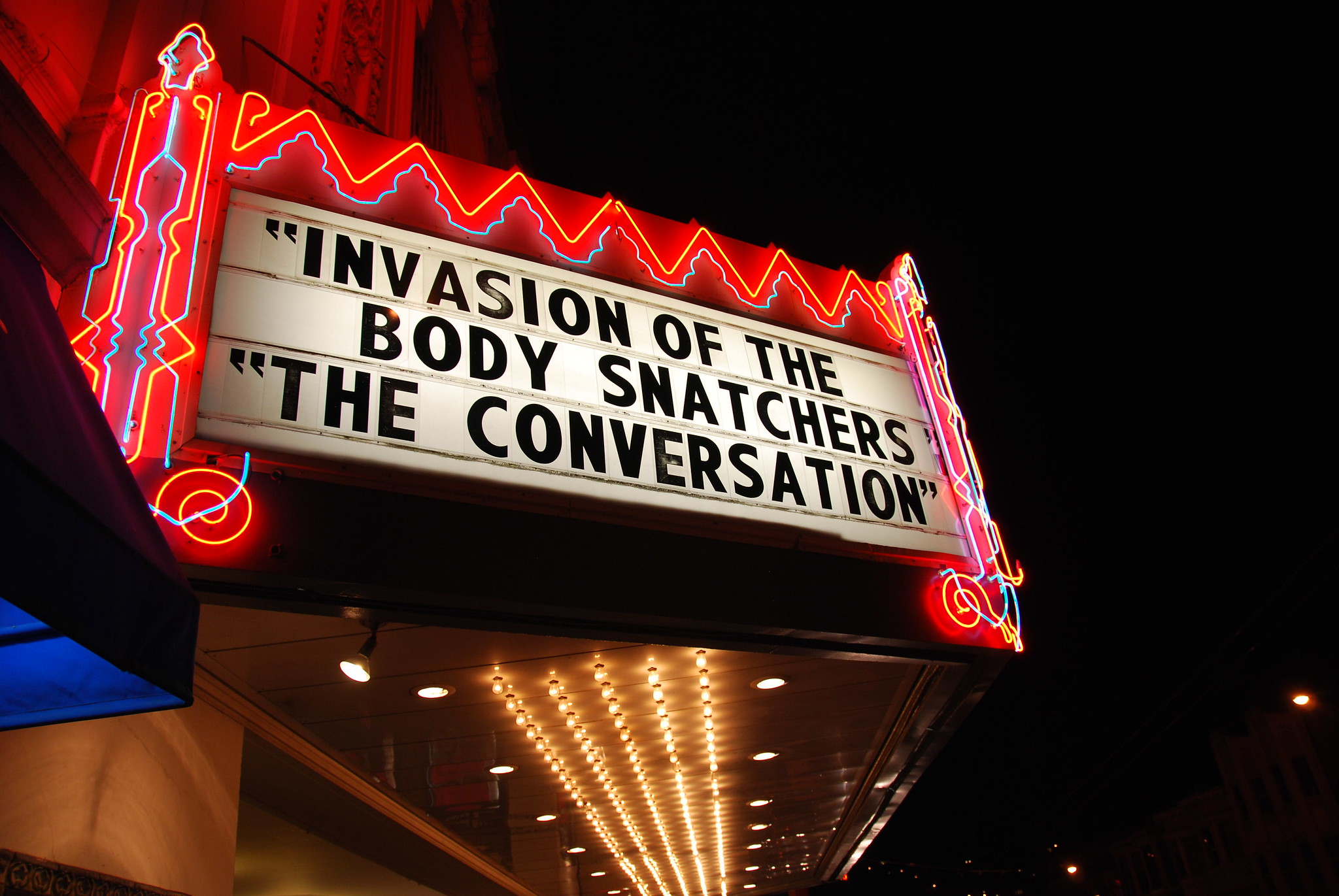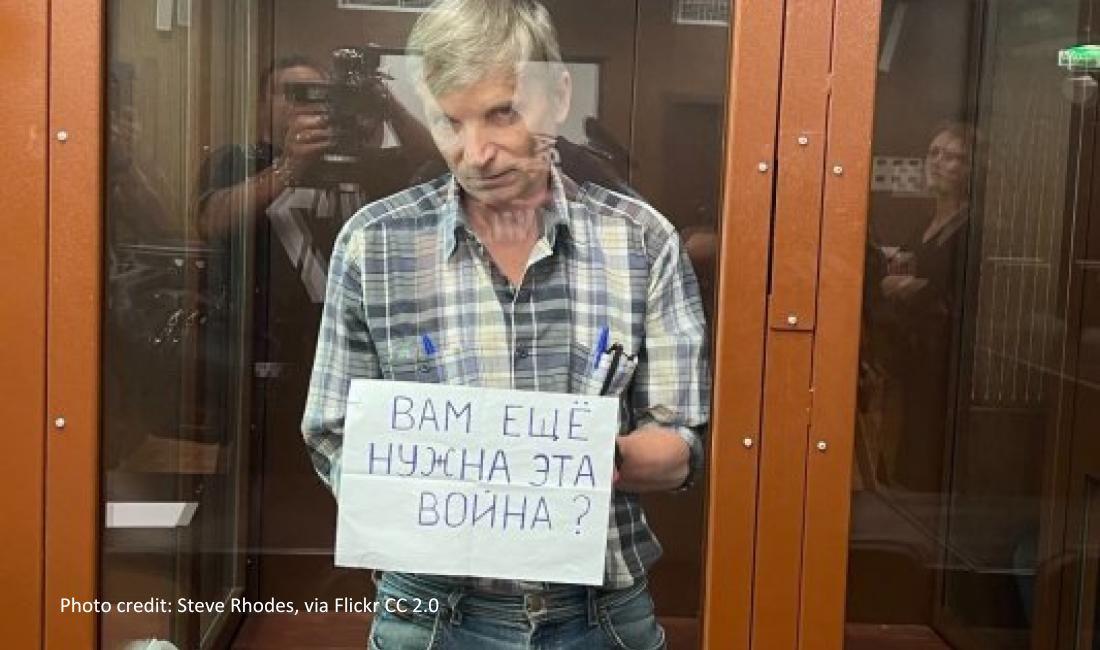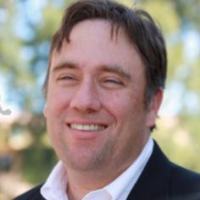Summer films, songs & reading, in local democracy. Also: Dem Next to Kashmir
Photo credit: Gorinov, at hearing, holds a sign that asks, "Do you still need this war?" Via wikimedia CC BY-SA 3.0 Photo credit: Steve Rhodes, via Flickr CC 2.0.
FREE ALEXEI GORINOV TOO
Why not Alexei Gorinov?
When I heard the news of the prisoner exchange between Russia's Putin regime and the U.S. and its allies, I found myself looking in vain for Alexei Gorinov's name.
Because Gorinov is not well-known political figure, he might be the important political prisoners in Russia.
He's a local democrat. The sort of person whom we all know.
He is an independent local councilor in a Moscow district of just 47,000 people. Essentially, your neighborhood representative. He's 63, a lawyer, with some experience in business.
And in 2022, he was sent to a Russian prison for 7 years for the crime of telling the truth. In a district council meeting, during a conversation about a children's drawing contest, he called Russia's attack on Ukraine a war, and noted that children were dying there. "What kind of children's drawing contest can we talk about for Children's Day ... when we have children dying every day?" he said.
Gorinov's is a reminder that Putin is waging war not just against Ukraine. He's waging war against democracy even at the neighborhood level, which means he is waging war against everyday people.
Free him now.
DO YOU HAVE LOCAL DEMOCRACY DATA TO SHARE?
At Democracy Local, we're using AI to try to build an open, flexible, planetary data set on local democracy and governance. If you have data or data sets to share, please reach out to me at joe@democracylocal.com or by WhatsApp at +1 2139445449
SUMMER MOVIES: LOCAL DEMOCRACY DEPARTMENT.
How do local democracies respond under strange and unexpected attack?
Looking for answers, I recently re-watched two versions (1955 and 1978) of the horror movie class, Invasion of the Body Snatchers. The films, about “pod people” who take over the bodies of humans, are generally described as metaphor. The 1955 version, in black and white and set in a fictional Southern California town, has long been seen as a Cold War parable, about how fear takes over us. The 1978 version, starring Donald Sutherland and set in San Francisco, seems the epitome of that era’s cultural transformations and violence.
But both films are fundamentally about local government. In each case, local officials are left on their own to confront a planetary threat—the pod people are from outer space—that higher levels of government don’t recognize.
Viewed in a 21st century context, both films make an argument for stronger local democracies, with the power and people to save the earth from the big threats that engulf them.
Both movies are a lot of fun, too, and widely available on streaming services all over the world.
And if you’re not so big on pod people, take a look at some other great films about local democracy.
• Jaws (1976). which is really about a mayor who doesn’t understand emergency management. There’s also a shark.
• Leviathan (Russia), about what happens when authority is challenged in a small town.
• The Mayor (Korea). This is a fictional, noirish film about local politics in Seoul.
• Even the Rain (2010). Set in a Bolivian city (and produced by an international consortium), this is a film about a Spanish movie crew that ends up in the middle of a local war over war.
• Mayor (Palestine). This funny and wise documentary is about the real-life mayor of Ramallah, Musa Hadid, and his remarkably successful efforts to govern a city surrounded by conflict and Israeli settlements.
HOW THE MARCHES CHANGED OUR KASHMIR COMMUNITIES.
Writing for Democracy Local from Muzaffarabad in Pakistan-administered Kashmir, veteran multimedia journalist Adnan Yousaf offers a powerful account of the recent protests and marches that are transforming democracy in localities across the region.
Action committees have made regional government, and the national Pakistan government, bend by focusing on specific demands—cutting the prices of wheat flour and electricity, and ending the privileges enjoyed by ministers and bureaucrats. Yousaf also describes how, in the face of a government crackdown, women’s marchers came together to win the day.
And he shows how the Kashmir is a “fake” local democracy, with a legislative assembly controlled through pre-poll manipulation by the national government and intelligence services.
I hope you’ll spend some time with the story.
WHAT’S NEXT FOR DEM NEXT?
Democracy Next, the Europe-based, global NGO devoted to citizens assemblies and related tools, has been growing rapidly for two years. They’ve taken on new board members, including the pioneering Taiwanese digital minister Audrey Tang; are establishing new collaborations with cities; and now are helping organize a rare citizens assembly in the U.S.
Democracy Next is part of the team behind a local citizens assembly this fall in Deschutes, a lesser populated county in eastern Oregon (USA). Democracy Local will be in Bend, Oregon, to cover the assembly’s opening September 14.
To get a sense of the potential and problems of citizens assemblies at the local level, read this Democracy Next interview with Elian Belon, the General Secretary of the Paris Citizens’ Assembly. For the first time, the elected city council in Paris took up major legislation written by the permanent citizens’ assembly, which had 100 people chosen by sortition to represent all walks of life, and made it law.
In effect, the city council closely examined 43 recommendations from the Assembly, which studied policy both on preventing homelessness and intervening to assist those who are homeless. And it edited those 43 ideas down to 20 which were included in the legislation. Among the ideas: extended the French social aid for children to age 25, to prevent homelessness among young adults; increasing emergency housing and social housing; creating a welcome space for people newly arriving in France;
Read the the Citizen Bill. The council legislation is here. For more, watch this video.
THE LOCAL DEMOCRACY INSIDE A WAR-TORN DICTATORSHIP.
In NOEMA, Charles Petrie, a former United Nations assistant secretary general and U.N. representative in Myanmar (2003-2007), reports from inside Myanmar’s civil war about “novel and participatory forms of local governance” emerging in opposition-held communities.
Creating such local democracy is a remarkable achievement in a country ruled by dictatorship. The trouble is that under current rules that direct international aid to national governments, it’s hard to assist communities that are resisting war and dictatorship through democracy.
Petrie convincingly argues that these local advances within Myanmar demonstrate the need for “a new form of international engagement… that complements existing humanitarian approaches to reaching populations caught up in civil wars or living under oppressive military regimes. For however dramatic and intense the conditions ordinary people confront in such contexts, their community structures continue to function. It is on such local governance structures that any international effort in contested political settings should be built.”
Petrie’s argument dovetails with efforts to aid and rebuild Ukraine’s cities. Democracy Local will have much more to share on this subject in the fall.
READINGS
Josh Lerner, co-head of the vital and expanding global participatory organization People Powered, has a thoughtful paper on how the new, better way to understand democracy—as a series of ecosystems.
The Solonian Democracy Institute’s interview with Melbourne, Australia, writer and activist Godfrey Moase, chair and co-founder of the non-profit energy cooperative CoPower, about direct democracy and democratic practice in energy and a labor union.
I have been wrestling with events in the presidential campaign in the United States. Here is my column about my fellow Californian Kamala Harris, and my piece in El País, the Spanish-language media giant, about the larger, violence context behind the attempted assassination of Donald Trump.
TWO GREAT SONGS FROM ASIA
Our partners at Asia Democracy Chronicles have two great pieces up about songs and democracy.
In Nepal, using music as a weapon in local attempts to prevent the killing of wildlife. https://adnchronicles.org/2024/06/28/songs-for-saving/
And how the song “Glory to Hong Kong” became to be banned in Hong Kong. https://www.democracy.community/stories/suppressing-city-song
DEMOCRACY TYPE OF THE MONTH: “Deep” Democracy. Or Just People Power?
A University of Washington (USA) paper has a new conception of democracy grounded in public health that is being called “deep” democracy.
In other language news, the linguist John McWhorter, a New York Times columnist, suggests that people stop talking about democracy—especially protecting democracy—because democracy isn’t a very good word. Also, it’s ancient and Greek. What’s better? People Power.
QUOTE FOR THE ROAD:
"Did you, too, O friend, suppose democracy was only for elections, for politics, and for a party name? I say democracy is only of use there that it may pass on and come to its flower and fruit in manners, in the highest forms of interaction between [people], and their beliefs – in religion, literature, colleges and schools – democracy in all public and private life.”
—Walt Whitman
LINKS TO LOCAL DEMOCRACY RESOURCES AND PARTNERS
Democracy International and democracy.community
Federation for Innovation in Demcoracy-Europe and FIDE North America
United Cities and Local Governments
International Observatory of Participatory Democracy
ASU Participatory Governance Initiative
Taiwan Foundation for Democracy
National Civic League’s Center for Democracy Innovation
Journal of Deliberative Democracy
Local Government Information Unit
SUBSCRIBE TO THIS NEWSLETTER
By emailing the author at joemmathews@gmail.com, or signing up here.





